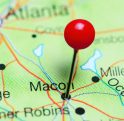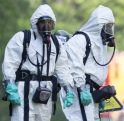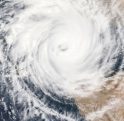Sept. 30 Emergency Preparedness Newsletter
This issue of the National Preparedness E-Newsletter contains:
- Hurricane Preparedness in Central Georgia
- School Response Bag Project is a Big Success
- Prepare for Zika!
- Would You Help? Could You Help?
- Your Responsibilities During an Emergency
- National Preparedness Quiz Winners Announced!
Hurricane Preparedness in Central Georgia
Hurricane season is from June 1 until November 30 each year. Although the North Central Health District is more than 120 miles from the coast, Central Georgia can be impacted by hurricanes that strike either the Atlantic Coast or the Gulf Coast. Hurricanes can bring high winds, heavy rains, floods, power outages, and tornadoes to Central Georgia.
Personal and Family Preparedness: When severe weather is approaching, make sure your disaster kit is nearby. Listen to local radio or TV stations for weather updates. Have a battery-operated radio in your house in case the power goes out. A NOAA weather radio will alert you when there are severe weather watches or warnings.
Prepare a disaster kit for your home: Stock up on nonperishable food and water to sustain you and your family for up to 72 hours or longer. Make sure you have important papers (e.g. insurance, identification), first aid kit, a supply of prescription medicines and other specialty items in your preparedness kit. In addition, plan to have an emergency kit for your car in case you need to evacuate. While creating a disaster kit, pet owners should remember to pack the necessary items for their pets.
School Response Bag Project is a Big Success
The School Response Program covers public high schools located in the counties served by EMS Region 5 and Healthcare Coalitions F and H. School Response Bags are designed for mass casualty events in which EMS response may be delayed or when immediate first aid might be warranted.
Schools participating in the program train at least ten employees in the use of the bag’s contents, basic management of airway and breathing, CPR, and hemorrhage control. Training is designed for “non-traditional” lay responders to enable them to render medical aid while they await the arrival of professional responders. Bags include ten bleeding control modules and eight first aid modules.
Prepare for Zika!
It’s important to have a plan in place when disaster–or even just a new virus–threatens. You can protect yourself and do your part to stop the spread of Zika with these simple tips:
Tip ‘N Toss to Stop Mosquito Habitats:>
- Tip water that’s collected in rain gutters, buckets, toys and more. Mosquitoes breed in standing water.
- Toss any outdoor containers that you don’t need into the trash.
- Drain temporary pools of water or fill them with dirt.
- Keep swimming pool water treated and circulating.
Avoid Getting Bitten:
- Wear long pants, long-sleeved shirts and socks.
- Use insect or mosquito repellent with at least 20% DEET.
- Stay indoors at sunrise, sunset and in the early evening when mosquitoes are most active.
Remember: Not all mosquito repellents have enough DEET to keep mosquitoes at bay, or work for the length of time that you’ll need. Use this search tool created by the CDC to find the best insect/mosquito repellent for you!
Would You Help? Could You Help?
The Central Georgia Medical Reserve Corps (CGMRC) was founded and registered with the Medical Reserve Corps Program Office in October 2006. The CGMRC is a medical response unit that will react to any medical emergency that may occur in the North Central Health District. The CGMRC serves the 13 counties in the Central Georgia area that comprise the North Central Health District.
The benefit of developing CGMRC was realized during past emergencies in the Central Georgia area, most notably during the Hurricane Katrina evacuation. Volunteers were recruited during these emergencies, but the recruitment procedures required more organization and coordination during an emergency medical situation. It is also thought that maintenance of a reliable medical volunteer pool would ensure that the community is prepared for a coordinated health and medical response.
The CGMRC recruits medical and non-medical volunteers and provides training to ensure that there is a trained team ready to respond and provide medical surge capacity backgrounds when needed. All volunteers will receive training for their roles in an emergency.
For more information related to the CGMRC or answers to questions related to volunteering and becoming a part of the CGMRC, please visit www.northcentralhealthdistrict.org/mrc or call 478-751-3029.
Your Responsibilities During an Emergency
The following is an excerpt from one section of the North Central Health District Emergency Operations Plan. This section includes the expectations that Dr. Harvey, District Health Director, has of all public health employees in regards to responding to emergencies. As a public health employee, you are expected to respond to emergencies and help as needed, even if it’s at a time that you wouldn’t normally be working.
- All employees are expected to have a family emergency plan in place which will shorten the time required to report to work during a disaster or emergency.
- North Central Health District and County Board of Health employees are expected to report for work during an emergency or disaster.
- All supervisors shall include emergency preparedness and response in each employee’s Performance Management Plan.
- All employees will report to work after implementing their family disaster plan, having ensured their personal safety and that of their families.
- The District Health Director may require employees to perform duties other than their usual work assignments. Employees may be required to work at alternate locations and for time periods that may differ from their usual work schedules.
- Employees who are direct victims of the emergency or disaster will notify their supervisor as soon as possible. Affected employees will not be asked to return to work until their immediate emergency or disaster-related needs are met. As soon as possible, the affected employees shall notify their supervisor of their availability to return to work.
National Preparedness Quiz Winners Announced!
More than 70 NCHD employees participated in our National Preparedness Quiz, and we were incredibly proud of your knowledge in emergency preparedness! However we could only have two winners, and those two are Jason Smith of Washington County, and Colin Duke of Baldwin County! Congrats guys! We’ll reach out to you soon with details on how to claim your prize.
For those of you who just needed to know, below please find the quiz questions and all correct answers. Again, great work, everyone!
Quiz Answers:
- “A consistent nationwide approach for federal, state, tribal and local government to work effectively and efficiently together to prepare for and respond to all hazards, including acts of terrorism” describes:
Answer: National Incident Management System (NIMS) - A tool for managing an organization’s emergency response activities, utilizing principles of command, control and coordination is:
Answer: Incident Command System (ICS) - An example of a Man-Made Disaster would be:
Answer: Aviation Accidents - An example of a Natural Disaster would be?
Answer: Heat Waves - What is the most common type of natural disasters in Georgia?
Answer: Thunderstorms & Flooding - What year were the Mother’s Day Tornados?
Answer: 2008 - “A United States federal law designed to bring an orderly and systemic means of federal natural disaster assistance for state and local governments in carrying out their responsibilities to aid citizens” is:
Answer: The Stafford Act - In Georgia’s Emergency Operations Plan, Public Health has primary responsibility for which Emergency Support Function?
Answer: 8 - In the event of a Tornado, what is the proper response?
Answer: Shelter in place - Where within District 5-2 were evacuees from Hurricane Katrina sheltered in 2005?
Answer: Rock Eagle 4-H Center


 Contact Us
Contact Us Locations
Locations Job Openings at North Central Health District
Job Openings at North Central Health District Internships
Internships Board of Health
Board of Health Cost and Insurance
Cost and Insurance Privacy Policy
Privacy Policy Teens & Adults
Teens & Adults For Children
For Children Other Programs
Other Programs County Environmental Health Offices
County Environmental Health Offices Chemical Hazards
Chemical Hazards Tourist Accommodations
Tourist Accommodations Food Service
Food Service Rabies Control
Rabies Control Lead Poisoning Prevention
Lead Poisoning Prevention Body Art
Body Art Land Use
Land Use Swimming Pool Program
Swimming Pool Program Water Testing for Private Wells
Water Testing for Private Wells Environmental Health Complaints
Environmental Health Complaints Georgia Food Recall Alerts
Georgia Food Recall Alerts Personal & Family Preparedness
Personal & Family Preparedness Emergency Preparedness for Functional & Access Needs
Emergency Preparedness for Functional & Access Needs Severe Weather Preparedness
Severe Weather Preparedness Emergency Preparedness Training
Emergency Preparedness Training Medical Reserve Corps
Medical Reserve Corps Regional Healthcare Coalitions
Regional Healthcare Coalitions Strategic National Stockpile/Medical Countermeasures
Strategic National Stockpile/Medical Countermeasures